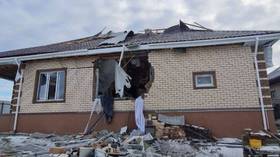Monday's press review

As the end of the year approaches, the Russian newspapers focus on a retrospective view of 2008 and a cautious prognosis for 2009. Some see it as gloomy, others – as a light at the end of the tunnel.
ROSSIYSKAYA GAZETA presents an opinion piece by the last president of the USSR, Mikhail Gorbachev. He discusses the changing political and economic realities in the light on the global economic crisis. According to Gorbachev, the world is still readapting following the end of the Cold War. Today’s crisis will not be subdued, unless the world moves away from a free market economy, according to the ex-president.
VEDOMOSTI looks at how the crisis has hit Russia in comparison with its neighbors. The collapse of the Ukrainian economy was 7 times faster in November than it was in October, according to Vasiliy Kashin, Vedomosti’s correspondent. According to the report, the Ukrainian grivna is scheduled to fall by another 24% in the coming year.
NOVAYA GAZETA publishes an opinion piece by Yulia Latynina, in which the newspaper’s staff political analyst argues that Russia’s economic problem lies with the country’s political organization and not the world economic crisis. According to Latynina, the government could previously break even, despite bad financial judgment. But with the fall in the prices for oil, money in the reserves became scarce, displaying that the economic stability within Russia was allegedly incidental, and not thanks to the government’s good judgment.
KOMSOMOLSKAYA PRAVDA quotes the Russian Prime Minister, Vladimir Putin, and his plans for tackling Russia’s economic troubles. According to Putin, the money in the state reserves is not enough to tackle private businesses’ problems. The Prime Minister is quoted to have pointed out that the government cannot continue solving corporate problems using taxpayers’ money.
NEZAVISIMAYA GAZETA focuses on the fact that the government does not deny a possibility of a two-fold increase in Russia’s unemployment figures. In addition to this, average income figures are predicted to continue their rapid, yet steady decrease. The daily then proceeds to cite several government officials, who point out the key areas of the economy which have suffered the most so far. They are: metallurgy, mechanical engineering, chemical manufacturing, constriction and shipping operations.
Anna Bogdanova, RT












